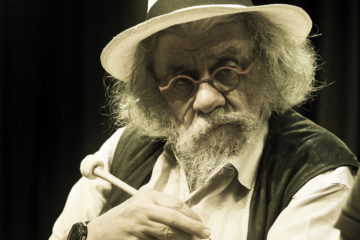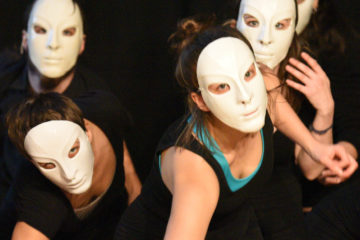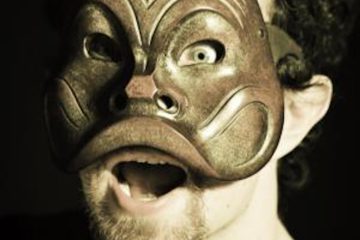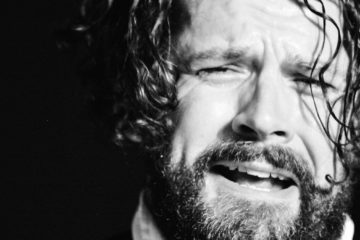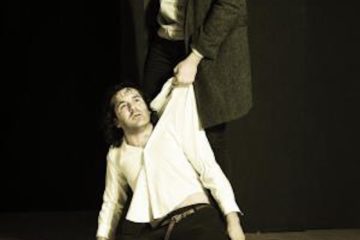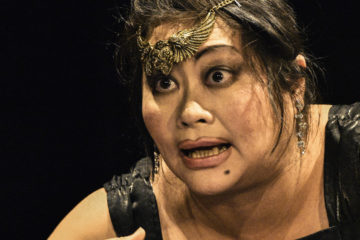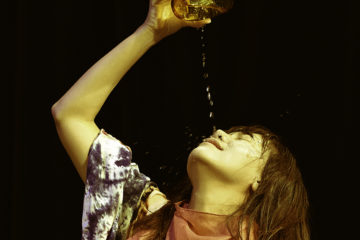Year Course Oct 2021-June 2022
These courses are open to anyone who wants to work in theatre professionally who is 19 years or older.
The year programme is made up of 3 terms with 8 different subjects which follow the stream of Philippe Gaulier’s pedagogy. One may apply for as many courses as one wishes or for a single course.
There are no auditions or interviews. First come, first served.
Students may choose to do one course, a number of courses or to do the whole year – it is up to the student to decide.
You can take any combination of courses, it is not necessary to do a full term or a full year.
The discount price was set up for students doing a full term or seasonal courses.
Each class of this course has a capacity of 30 people. Classes may be cancelled if the number of applicants is less than 20 people.
.
Why begin with the ‘‘Jeu’’ (Game & Play). It is the source of everything; of the pleasure and desire to be an actor. Playing in the theatre is the same as playing at running, jumping, fighting as people and animals do: playing cowboys, Indians, soldiers, doctors and with dolls. In the workshop on ‘‘Le JEU’’, we learn the meaning of all the basic teaching terms that will be referred to throughout the year: complicity, fixed point, playing in major and minor keys and their reciprocal pleasures ; we learn to say that we are actors and that it’s scary but that being scared is part and parcel of being an actor, part and parcel of the pleasure.
We learn in the workshop on ‘‘Le JEU’’ to place the character we are playing on top of our pleasure to be playing, never to kill this pleasure but on the contrary increase it by searching for complicity and jokes with our Partner. Never should an actor playing a melancholy character be melancholy. On the contrary. While always showing his pleasure, he will at every moment indicate that none of this is for real and we will believe him precisely because none of this is for real. In the theatre, we don’t believe what is true. We believe – in honour of our childhood no doubt – what is false, totally false.
During the workshop on ‘‘Le JEU’’, the student will question himself: Is my pleasure immense when I play with the freshness of my childhood before a thousand spectators beneath two thousand theatre projectors, or not really so immense?
If it’s not immense, leave the stage. You won’t be loved enough.
Time for Greek Tragedy to make her thunderous entrance. Are not her heroes shrouded in an aura unlike any other? Does not their destiny, their perpendicular destiny written above their heads by unjust gods, force them to walk upright and to be big, always big? Because if through inadvertence a god should happen to see a hero lose his stature, he would go straight off and tell the other gods about it. And every god in Olympus would burst out laughing. And the hero would be Fallen for ever.
Being big, walking without losing one’s marvellous aura, displaying a tremendous charm, being happy to have been singled out by the gods and to have had inscribed above one’s head a unique and iniquitous destiny; is not all this the source of extreme pleasure for the hero? And extreme pleasure for the actor?
Students will work with masks from the Italian Commedia. The time for lightness has arrived. Moliere and Goldoni will lend their texts to the actors who will have a lot of fun, like the fun we have in Seville the week of feria, late into the night and into the early morning. Here, everything is entertainment, charm, distraction, enjoyment, serenade, nonchalance.
It’s true that playing is a luxury and that one plays better when hunger is not gnawing away at one’s stomach. An actor who played beneath two thousand light projectors without showing in his eye the desire for something useless, extremely useless but very desirable, would not be good. In the last week of the workshop the students make their own masks.
Melodrama is a form of ideological theatre born in France around the mid-19th century and in which the actors played for all they were worth.
They copiously exaggerated their gestures, spoke in loud, slow voices full of pathos and rolled their ‘r’ s a great deal. They greatly amplified the noise of their shoes and when they stopped moving, their fixed point lasted a long time, a very long time. The solemnity of their themes – the poverty of the people, the tubercular prostitute, the lighthouse keeper who must kill his rabid son etc. – can explain this grandiloquent, bombastic style, but so too can the lack of material means: the lighting is dim, the audience in the gods rowdy and drunk. They must be subdued at all costs by raising the actor’s voice more and more. The man who has been drinking must be given strong, resistant fixed points in order to help him not lose his balance.
The melodrama actors show an incomparable pleasure in playing and the exaggeration on which they built this style remains today a great lesson in theatre. Of course, the themes treated can seem a bit ridiculous but a good melodrama reminds us that around the age of eleven we cried a great deal Reading ‘‘Sans Famille’’ by Hector Malot or ‘‘David Copperfield’’ by Dickens. Those were the good old days! The melo days.
The Bouffon is a crippled out cast, a lame person, a legless or one-armed cripple, a dwarf, a midget, a whore, a homosexual, a witch, a heretical priest, a madman. He has not been chosen by the gods. He has been chased into the swamps and ghettos by the children of god in fact, who have seized the opportunity to announce that in view of the bouffon’s physical and moral ugliness, the father could not be a great artist of international fame. So his father was the opposite of God, his father was the devil
Lucifer. The Bouffon was elected son of the devil and he was happy about this. He was happy to be the son of the first Tempter and of the first women seduced: Eve.
In the Bouffon workshop we learn to be a big person who enjoys being Small, with a special additional pleasure enjoyed by those people: blasphemy .
Character, was created, why?
Because the students always play too much, so much that they lose their aura, their charm, their soul. I will give to each student a costume to dress up in before class. We will improvise. We will play scenes. We will write for him or her. They’ll have three weeks to discover which characters their desire carries them towards, and to discover that playing means giving what the audience needs in order to continue dreaming about the character, not an ounce more that this. An ounce more would break the charm and everything would fall back onto the ground again in reality, in a thousand pieces.
The time has come for the student to give to Shakespeare and Chekhov his pleasure in playing, in playing not the character but with his partner (Complicity, pleasure, jokes) .
It is time to give to Shakespeare and Chekhov one’s great humanity, one’s charm , one’s colourful language, one’s life, one’s blood, and to imagine these men saying :
‘‘You have, Mr. Actor, given the most beautiful things in your life to my theatre, just as I gave the most beautiful things in mine to the music of my words. Thank you.”
A good actor collaborates with his friends the authors , a bad one imagines he is the servant of these eminent men.
For a number of reasons, the clown is placed at the end of all these experiments with play. Why? Finding one’s own clown, in other words a unique idiotic character, is an important moment in a student’s life. It’s good to do this when everybody knows each other, likes each other and it helps when everybody is ready to let idiotic, silly, mad things burst out because the pleasure of being together has been great. The second reason: the way in which the clown plays is very special. He uses not only his normal virtuosity as an actor, but also the frequent appearance of a playmate: the flop .
In my school, we call him Mr. Flop, because we treat him with a hell of a lot of respect. It is funny that playing with Mr. Flop happens after many many other flops that weren’t at all deliberate, that weren’t playmates. Then, Mr. Flop says to the clown: salvage what you can. So the clown lets the audience see the great delight of a child who wants to stay on the stage, and who lets out a very special yell. We carry on loving him. He has saved the show. This childish pleasure is like that of one of my sons who when I ask him to go to bed because it is late and friends are there drinking and having fun around the table, goes off muttering that none of this is fair and he is not tired. Five minutes later he’s back again, hugging the walls, hiding behind the furniture, the curtains. He will pop out soon. He will let out a very special yell and show his great desire to stay. OK- ten minutes but no more.
If the pleasure in staying is great, then the clown is forgiven. He’s allowed to be no good over and over again. If the pleasure is not great, the clown will look like someone ashamed at being no good. He won’t be loved. We’re back to this notion of pleasure which throughout the year will refuse to leave us alone.
